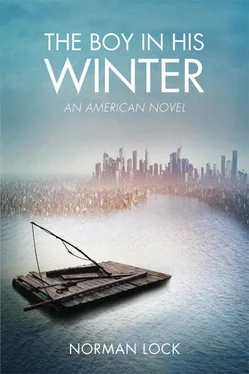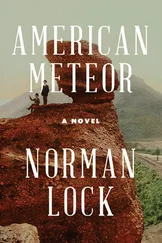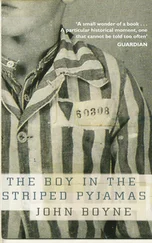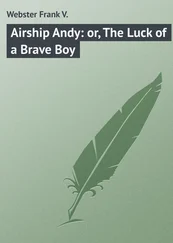And what about Jim? I can’t help wondering what his body might have done to the river that upheld me. Did it change it a little as tea leaves do water? Did it alter it profoundly, contributing Jim’s atoms to the river’s own? Was I with Jim while I passed blindly down an unused passage of time: a back channel long ago closed as unnavigable, a worm hole that would shortly deliver me into Mexico? I wish I could recall whether Jim had said anything about Mexico. I could make something up, I suppose. I’ve done so often enough. But what good would it do?
The years flowed into one another: 2001, 2002, 2003, 2004. . The river reasserted itself, although not entirely. It materialized as if it were emerging from a fog. As if the world strained toward recognition and revelation where nothing is recognized or revealed. Yes, that is what it was like: An ordinary fog — wet, bluish gray, and pervasive — replaced the tumult of sensations that had been the world for me, as it is for a blind person. No matter I could see only a very short distance at any compass point; fog was a common occurrence on the river. I had dealt with it many times before this. I imagined that, when the fog lifted, I would see New Orleans.
Once more, I could feel the raft moving, and with it me. Time quickened, and my body registered a slight pressure: what a barometer might feel in the moving column of mercury. I felt heavier; my body began again the ancient struggle with gravity. I was not yet completely in time, neither had I been returned, by motion, to the special time of myth, of the literary history in which I had been immersed. . how long? Since 1835, when Jim and I had set out on the raft. Maybe longer. What do I remember of the thirteen years of childhood that had gone before the start of our journey? Light and a feeling of lightness, which are no more than vague recollections of childhood, summoned in old age.
What else?
A few vividly colored memories of having played by the Mississippi and in Hannibal’s streets and alleys with Tom Sawyer and Becky Thatcher, of having tormented Jim, of having been afraid of Injun Joe, of having hated Miss Watson and the Widow Douglas. Of a circus, a minstrel show, a tent meeting. I’m infuriated by a boyhood that seems, even now, not to have belonged to me but, rather, to have been written for me; and I fear much of my adult life has been spent in a futile resistance to fate. Many times, I did bad things for no other reason than I believed I was acting contrary to what Presbyterians call “predestination.” By whatever name, the notion upsets and revolts me. But maybe we live our lives in just that way. What about you? Nothing to say? You look half-asleep. I would send you home, but my story — the first part of it — is nearly finished.
The fog still had not lifted at New Orleans, but I could hear the city, its sounds coming as if from a long way off: noise of cars, trucks, buses, trains, and also ships of varied use and tonnage, blaring horns, tolling bells, the steam whistles of factories and the roar of airliners flying unseen high above me. I speak, of course, in hindsight; I was not yet of the world or in it. I couldn’t know what the world had become in my absence. But in my heightened sensitivity, I also heard people at work, in love, in contention, at war, at their prayers, beseeching mercy, love, release from pain; heard people dying solitary deaths. In this, the world had not changed, nor will it ever.
You won’t believe what I’m about to tell you: I saw Tom Sawyer and Jim, Henry Wilson and the old Choctaw Indian — as they were in life or as they are in death, I couldn’t say. One by one, they appeared to me out of the fog. None had a word for me although I thought I saw Tom raise his hand to salute me, to wave good-bye, or to summon me. I don’t know. What do we know? What can we tell or say about another? Jim wore the cut piece of rope like a necktie. Henry clutched his cornet. The Indian looked as if his eyes were gazing on the beyond.
Do I believe in ghosts?
Having been one myself, I do believe in them and in much else besides that is strange and doubtful.
Two thousand and five. August. The twenty-ninth day. Plaquemines Parish, Louisiana. At Venice, southernmost town on the Mississippi, called by some “the end of the world,” I reentered the world and also time.
TIME BROKE OVER ME like an enormous wave, and I was overthrown by its weight and finality. (To admit time is to admit its end.) It staggered me, like an ox by the sledgehammer. I fell to my knees, but with no thought of praying; my fear was too immediate and electric, crowding out all other thoughts but it. Besides, I had not the habit of prayer and would rather have cursed God in stubborn contrariety because of Miss Watson’s belief that a child could be made pious by the rod and cod-liver oil. She’d tried them on me often, and failed. Unless you were ever, even for a moment, outside time, you can’t know what it means to be thrust into it. Maybe those who die and venture a little way toward the light or the final darkness, only to be pulled back once more into the body, know; maybe those under the influence of certain psychotropic drugs do. But I suspect you’ve experienced neither death nor a powerful hallucination. If you don’t mind my saying so, you have the look of a cautious man who does not stray far from the polished rails of time.
All around me, while I clung to the sternpost, the winds roared. The sweep oar was gone, and soon the raft would be capsized by waves of water that the hurricane caused to accumulate into a mounting surge. Sky and river appeared a seamless gray, relieved by blackness. I had never known fear to equal this moment’s, which increased with time’s strengthening hold on me. My mind was emptied of everything save the danger, the cold misery of my sodden clothes, and the pain in one hand from desperately clutching the post. Had I been able to ask questions at that harrowing instant, I think it would have been these: What will it be like to drown in time ? Will it be more painful than drowning in water when my lungs fill up? What organ does time — rushing in with the force of an arriving wave — swell and burst? I’ve since wondered at the tenacity of life: how it clings to the sternpost marking its outermost limit — to mortality’s outpost, if you like — when, by opening a hand, we might end our fear and pain forever. (Unless Miss Watson and her hellfire sorority were right about the afterlife, though I can’t believe those obnoxious souls could have been right about anything, except my own cussed and irremediable self.)
A noise was heard during the wind’s bellowing, like splintering glass, as if I’d gone through a window separating the geometric certainty of rooms from the violent irregularities of the world outside them. A noise announcing — with a crash of falling millibars — that a hurricane whose name was Katrina had reached the point to which its forces had been straining: the saturation of matter by energy. Electrified, my hair stood up; the air crackled; the sternpost and the lean-to’s frame (canvas torn away) trembled with blue and violet lights of St. Elmo’s fire. The air grew thinner as its atoms rose, and the world would have yielded to the seduction of weightlessness, had gravity, momentarily weakened, not resumed, and with it time. Unused to it, I would have been crushed if the raft had not been overturned at that instant by the unpent surge. I was thrown into the river, which retained a measure of timelessness — or if not so absolute a quality, then a record of past ages held within its turbulence: moments of the history that had shaped it since leaving its source at Lake Itasca and its origin, as far as humankind is concerned, in the fourth millennium before the Common Era, when, in its fertile valleys, squash, goosefoot, marsh elder, and sunflowers were cultivated by indigenous peoples, whose later flowering included an old Choctaw Indian. If my mind had not been overwhelmed by terror, I might have thought him a fool to have gone peaceably to his death in this same river. (I take a different view of rivers than Heraclitus did.) But nothing crossed my mind while I struggled up from the river’s black depths into the rain — saved, I have never doubted it — by the past, which has always been kinder to me than the present ever since I reentered time, off the western bank of the Mississippi, at Venice, on that catastrophic August Monday in 2005.
Читать дальше












